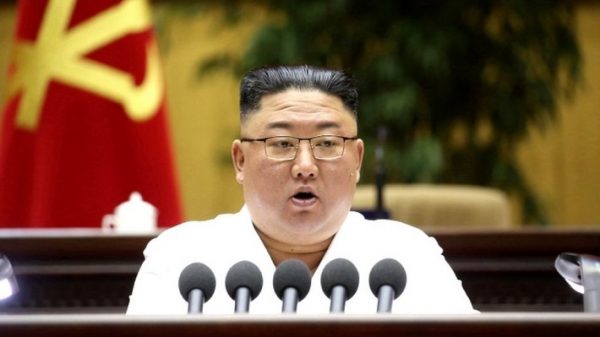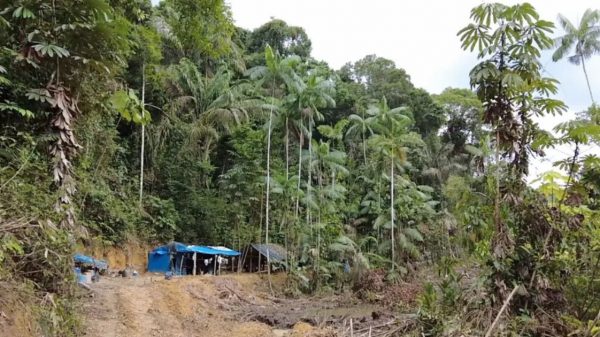Why Kim Jong-un waging war on slang, jeans and foreign films

Shawdesh Desk:
North Korea has recently introduced a sweeping new law which seeks to stamp out any kind of foreign influence – harshly punishing anyone caught with foreign films, clothing or even using slang. But why?
Yoon Mi-so says she was 11 when she first saw a man executed for being caught with a South Korean drama.
His entire neighbourhood was ordered to watch.
“If you didn’t, it would be classed as treason,” she told the BBC from her home in Seoul.
The North Korean guards were making sure everyone knew the penalty for smuggling illicit videos was death.
“I have a strong memory of the man who was blindfolded, I can still see his tears flow down. That was traumatic for me. The blindfold was completely drenched in his tears.
“They put him on a stake and bound him, then shot him.”
‘A war without weapons’
Imagine being in a constant state of lockdown with no internet, no social media and only a few state controlled television channels designed to tell you what the country’s leaders want you to hear – this is life in North Korea.
And now its leader Kim Jong-Un has clamped down further, introducing a sweeping new law against what the regime describes as “reactionary thought”.
Anyone caught with large amounts of media from South Korea, the United States or Japan now faces the death penalty. Those caught watching face prison camp for 15 years.
And it’s not just about what people watch.
Recently, Mr Kim wrote a letter in state media calling on the country’s Youth League to crack down on “unsavoury, individualistic, anti-socialist behaviour” among young people. He wants to stop foreign speech, hairstyles and clothes which he described as “dangerous poisons”.
The Daily NK, an online publication in Seoul with sources in North Korea, reported that three teenagers had been sent to a re-education camp for cutting their hair like K-pop idols and hemming their trousers above their ankles. The BBC cannot verify this account.
All this is because Mr Kim is in a war that does not involve nuclear weapons or missiles.
Analysts say he is trying to stop outside information reaching the people of North Korea as life in the country becomes increasingly difficult.
Millions of people are thought to be going hungry. Mr Kim wants to ensure they are still being fed the state’s carefully crafted propaganda, rather than gaining glimpses of life according to glitzy K-dramas set south of the border in Seoul, one of Asia’s richest cities.
The country has been more cut off from the outside world than ever before after sealing its border last year in response to the pandemic. Vital supplies and trade from neighbouring China almost ground to a halt. Although some supplies are beginning to get through, imports are still limited.
This self imposed isolation has exacerbated an already failing economy where money is funnelled into the regime’s nuclear ambitions. Earlier this year Mr Kim himself admitted that his people were facing “the worst-ever situation which we have to overcome”.
What does the law say?
The Daily NK was the first to get hold of a copy of the law.
“It states that if a worker is caught, the head of the factory can be punished, and if a child is problematic, parents can also be punished. The system of mutual monitoring encouraged by the North Korean regime is aggressively reflected in this law,” Editor-in-Chief Lee Sang Yong told the BBC.
He says this is intended to “shatter” any dreams or fascination the younger generation may have about the South.
“In other words, the regime concluded that a sense of resistance could form if cultures from other countries were introduced,” he said.
Choi Jong-hoon, one of the few defectors to make it out of the country in the last year, told the BBC that “the harder the times, the harsher the regulations, laws, punishments become”.
“Psychologically, when your belly is full and you watch a South Korean film, it might be for leisure. But when there’s no food and it’s a struggle to live, people get disgruntled.”
Will it work?
Previous crackdowns only demonstrated how resourceful people have been in circulating and watching foreign films which are usually smuggled over the border from China.
For a number of years, dramas have been passed around on USB sticks which are now as “common as rocks”, according to Mr Choi. They’re easy to conceal and they’re also password encrypted.
“If you type in the wrong password three times in a row, the USB deletes its contents. You can even set it so this happens after one incorrect input of the password if the content is extra sensitive.
“There are also many cases where the USB is set so it can only be viewed once on a certain computer, so you can’t plug it in to another device or give it to someone else. Only you can see it. So even if you wanted to spread it you couldn’t.”
Mi-so recalls how her neighbourhood went to extreme lengths to watch films.
She says they once borrowed a car battery and hooked it up to a generator to get enough electricity to power the television. She remembers watching a South Korean drama called “Stairway to Heaven”.
This epic love story about a girl battling first her step-mother and then cancer appears to have been popular in North Korea around 20 years ago.
Mr Choi says this is also when fascination with foreign media really took off – helped by cheap CDs and DVDs from China.
The start of the crackdown
But then, the regime in Pyongyang started to notice. Mr Choi remembers state security carrying out a raid on a university around 2002 and finding more than 20,000 CDs.
“This was just one university. Can you imagine how many there were all over the country? The government was shocked. This is when they made the punishment harsher,” he said.
Kim Geum-hyok says he was only 16 in 2009 when he was captured by guards from a special unit set up to hunt down and arrest anyone sharing illegal videos.
He had given a friend some DVDs of South Korean pop music that his father had smuggled in from China.
He was treated like an adult and marched to a secret room for interrogation where the guards refused to let him sleep. He says he was punched and kicked repeatedly for four days.
“I was terrified,” he told the BBC from Seoul where he currently lives.
“I thought my world was ending. They wanted to know how I got this video and how many people I showed it to. I couldn’t say my father had brought those DVDs from China. What could I say? It was my father. I didn’t say anything, I just said, “I don’t know, I don’t know. Please let me go.”
Geum-hyok is from one of Pyongyang’s elite families and his father was eventually able to bribe the guards to set him free. Something that will be near impossible under Mr Kim’s new law.
Many of those caught for similar offences at the time were sent to labour camps. But this didn’t prove to be enough of a deterrent, so the sentences increased.
“At first the sentence was around a year in a labour camp – that changed to more than three years in the camp. Right now, if you go to labour camps, more than 50% of the young people are there because they watched foreign media,” says Mr Choi.
“If someone watches two hours of illegal material, then that would be three years in a labour camp. This is a big problem.”
We have been told by a number of sources that the size of some of the prison camps in North Korea have expanded in the last year and Mr Choi believes the harsh new laws are having an effect.
“To watch a movie is a luxury. You need to feed yourself first before you even think about watching a film. When times are hard to even eat, having even one family member sent to a labour camp can be devastating.”
Why do people still do it?
“We had to take so many chances watching those dramas. But no-one can defeat our curiosity. We wanted to know what was going on in the outside world,” Geum-hyok told me.
For Guem-hyok, finally learning the truth about his country changed his life. He was one of the few privileged North Koreans allowed to study in Beijing where he discovered the internet.
“At first, I couldn’t believe it [the descriptions of North Korea]. I thought Western people were lying. Wikipedia is lying, how can I believe that? But my heart and my brain were divided.
“So I watched many documentaries about North Korea, read many papers. And then I realised they are probably true because what they were saying made sense.
“After I realised a transition was going on in my brain, it was too late, I couldn’t go back.”
Guem-hyok eventually fled to Seoul.
Mi-so is living her dreams as a fashion advisor. The first thing she did in her new home country was visit all the places she saw in Stairway to Heaven.
But stories like theirs are becoming rarer than ever.
Leaving the country has become almost impossible with the current “shoot-to-kill” order at the tightly controlled border. And it is difficult not to expect Mr Kim’s new law to have more of a chilling effect.
Mr Choi, who had to leave his family behind in the North, believes that watching one or two dramas will not overturn decades of ideological control. But he does think North Koreans suspect that state propaganda is not the truth.
“North Korean people have a seed of grievance in their heart but they don’t know what their grievance is aimed towards,” he said.
“It’s a grievance without direction. I feel heartbroken that they can’t understand even when I tell them. There is a need for someone to awaken them, enlighten them.”
-BBC





























Leave a Reply